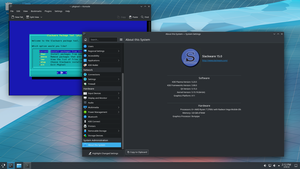
Back سلاكوير Arabic Slackware Azerbaijani اسلکور AZB Slackware BAR Slackware Bulgarian স্ল্যাকওয়্যার Bengali/Bangla Slackware BS Slackware Catalan Slackware Czech Slackware CSB
 | |
 Slackware 15.0 with KDE Plasma 5 as the desktop environment | |
| Developer | Patrick Volkerding |
|---|---|
| OS family | Linux (Unix-like) (based on Softlanding Linux System) |
| Working state | Current |
| Source model | Open source |
| Initial release | 17 July 1993[1] |
| Latest release | 15.0[2] |
| Available in | Multilingual |
| Update method | pkgtool, slackpkg |
| Package manager | pkgtool, slackpkg |
| Platforms | IA-32, x86-64, ARM |
| Kernel type | Monolithic (Linux) |
| Userland | GNU |
| Default user interface | CLI |
| License | GNU General Public License |
| Official website | www |
Slackware is a Linux distribution created by Patrick Volkerding in 1993. Originally based on Softlanding Linux System (SLS),[5] Slackware has been the basis for many other Linux distributions, most notably the first versions of SUSE Linux distributions, and is the oldest distribution that is still maintained.[6]
Slackware aims for design stability and simplicity and to be the most "Unix-like" Linux distribution.[7] It makes as few modifications as possible to software packages from upstream and tries not to anticipate use cases or preclude user decisions. In contrast to most modern Linux distributions, Slackware provides no graphical installation procedure and no automatic dependency resolution of software packages. It uses plain text files and only a small set of shell scripts for configuration and administration. Without further modification it boots into a command-line interface environment. Because of its many conservative and simplistic features, Slackware is often considered to be most suitable for advanced and technically inclined Linux users.[8][9][10][11][12][13]
Slackware is available for the IA-32 and x86_64 architectures, with a port to the ARM architecture. While Slackware is mostly[14] free and open-source software, it does not have a formal bug tracking facility or public code repository, with releases periodically announced by Volkerding. There is no formal membership procedure for developers and Volkerding is the primary contributor to releases.
- ^ Cite error: The named reference
comp.os.linuxwas invoked but never defined (see the help page). - ^ "Slackware 15.0 release notes". February 2, 2022.
- ^ "Slackware Release Announcement". The Slackware Linux Project. February 2, 2022.
- ^ Volkerding, Patrick (February 2, 2022). "Slackware 15.0 released". The Slackware Linux Project. Retrieved February 3, 2022.
- ^ Want an SLS like .99pl11A system?
- ^ Distrowatch.com. "Top Ten Distributions". Archived from the original on April 2, 2013. Retrieved July 22, 2017.
- ^ "The Slackware Linux Project: General Information". Slackware.com. Archived from the original on July 11, 2017. Retrieved July 22, 2017.
- ^ Slackware Inc. "Slackware FAQ: Slackware Linux has a reputation for being tough for newbies. Is this true?". Archived from the original on September 5, 2015. Retrieved October 8, 2015.
- ^ Datamation. "Top Linux Distros For Every Level User". Archived from the original on November 18, 2015. Retrieved October 8, 2015.
- ^ Linux.org. "Which Distro is Right for Me?". Archived from the original on October 9, 2015. Retrieved October 8, 2015.
- ^ Tech Radar. "Power user Linux distros: 5 reviewed and rated". Archived from the original on November 2, 2015. Retrieved October 8, 2015.
- ^ IT Pro (January 18, 2010). "Slackware Linux - Less is more". Archived from the original on November 19, 2015. Retrieved October 8, 2015.
- ^ PC World. "A Guide to Today's Top 10 Linux Distributions". Archived from the original on October 11, 2015. Retrieved October 8, 2015.
- ^ "FreeSlack". FreeSlack.net. Archived from the original on July 27, 2017. Retrieved July 22, 2017.
© MMXXIII Rich X Search. We shall prevail. All rights reserved. Rich X Search